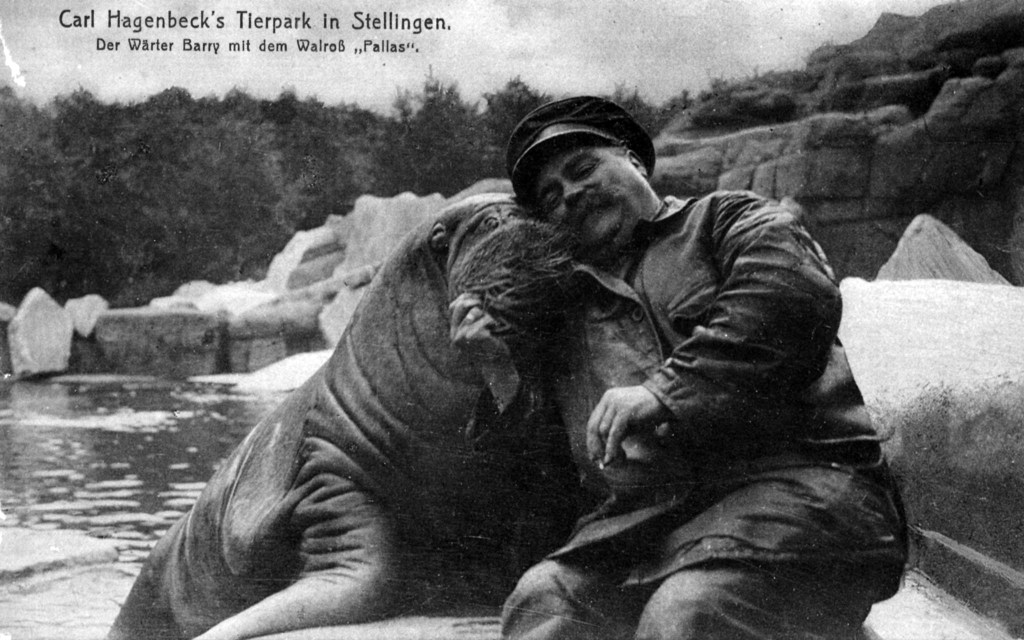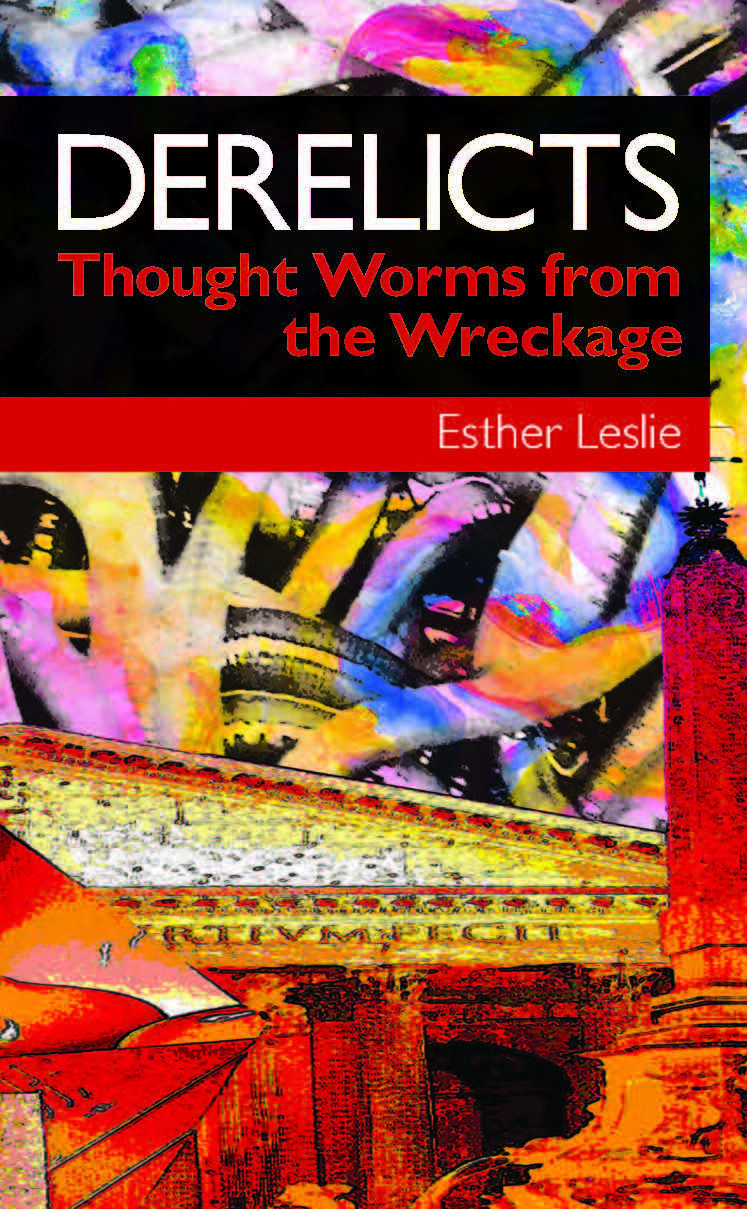Philosophy and art with the imagination to actually change the world: this is the unfinished dream of history and the heart of the revolutionary modernism of the early 20th century, which globalised war and exploitation managed indefinitely to defer. Esther Leslie reopens the cold case on filmmakers, artists, thinkers and other animals, exiled or otherwise Disneyfied, and finds still-warm fertile ground for a wild future as yet unfulfilled. From ideal homes with traces erased to utopian rivers drawn back to their source, the alienated subject of history discerns its rightful place in the present tense, with no room for buts or half-measures. The derelicts of history find new life beyond commodified thought: would that the same could be said for all their readers..
… full of freeform scholarship and timely lunacy, nugat, bubble tea n alien vegetation.
Michael Tencer
ISBN: 978‑0‑9568176‑9‑3 Published: Mar 2014, 254pp
Introduction: Times Change, They Stay the Same (Extract)
Persecution, exile and displacement; Walter Benjamin, Bertolt Brecht, Siegfried Kracauer, Theodor Adorno, Max Horkheimer, Kurt Schwitters, along with countless others, each in their own unique and alienated way, suffered the horrors of the twentieth century. The point of writing about these particular named men, and not of the myriad others here unnamed, is not to suppose that their suffering was worse than anyone else’s. Perhaps, for these men, there were even advantages in their dereliction. It loosened them from the world in which they grew up, in which they had been cushioned, for the most part. It made them think and write and act in inventive ways. As their old world was shattered, in various ways – technologically, politically, militarily, financially – so were, for them, the certainties that others still professed. The years between the two world wars were years in which these men came to their political awakening. The cities, with their institutions, nightlife, factories and offices, were the crucibles of this awakening.
These cities were more or less physically damaged in the first war. Some would be flattened in the next. Berlin was one such city. It was re-imagined in Nazi dreams as Germania. That re-imagining was predicated on the exclusion of these city souls, whose tenderly empirical observations had made city living into a technique and had made the city a place of study as prelude to revolutionary overturning. These men were perspicacious analysts of their everyday world and its vectors of power. They tabulated the small events of horror, the tiny losses and quotidian cruelties. They reformulated notions of friendship, of home, of nature, of exchange, of art, of rubbish.
This is a book about latent violence in the cities. In those cities capital takes up residence in every corner. This book is about the ways in which nature, including human nature, is assaulted, stage-managed or obliterated by industrial urbanism. It is not hopeless. It is also not about finding ways of being comfortable amidst the ruins. It takes on the motto of Walter Benjamin’s destructive character.
The destructive character knows only one watchword: make room. And only one activity: clearing away.
The destructive character seeks ways through. It is not about efforts to re-build the shards, but instead examines attempts to build something utterly different. It shares with its subjects the proposition that something has still to be built.
This book has a method, if a strange one. It seeks to follow the routes that thought takes when not succumbing to some sort of external authority, such as the superego, or disciplinary insistences. As Josef Dietzgen wrote, in the second of his ‘Letters on Logic’, to his son Eugene: 'It is a peculiarity of thought that it never remains by itself, but always digresses to other things.' Thinking and writing, in the spirited, critical, Marxist mode, draws energies from Marx, who wrote Capital in the wake of Lawrence Sterne’s Tristram Shandy. Sterne’s bawdy demolition of Lockean Rationalism inspired many memorable phrases in Marx’s political journalism – and Marx attempted his own emulation, titled Scorpion and Felix. This work in your hand digresses in order to reanimate and compose the world and its parts, plunging between registers, hurtling from one subject to another, rampant with connectivitis, conjuring up banal amusements next to tragic events. It is to be hoped that such procedure breaks the seemingly impermeable skin that Leon Trotsky once decried as the ‘bulkheads’ that prevented Anglo-Saxon thought from encompassing the dialectical, moving and faceted nature of reality. What the bulkheads failed to grasp was the process of historical change, which Trotsky encapsulates with these words: ‘The transition into its opposite’ 'Vernunft wird Unsinn Wohltat – Plage Vernunft wird Unsinn', reason becomes nonsense, Wohltat Plage, a good deed, a menace.
This line adapted from Goethe’s Faust expressed the ways in which institutions and social forces might outlive themselves and be destined for the scrap heap of history. Brecht put a similar sentiment in a song in his play of 1943, Schweyk in the Second World War, which was written while he was in exile in Los Angeles. It is sung twice, once when a drinker in a Prague hostelry is taken away by the Gestapo and once when the little man Schweyk, who has been battered by war and military prison and forced labour, is lost in a snowstorm near Stalingrad, amidst ice, frozen corpses and the Red Army. Here he meets Hitler who is lost too and who twitches in a grotesque dance and then disappears into the snow.
On the bottom of the Moldau the stones are turning
There are three emperors buried in Prague
The great do not stay great and the small not small
Night has twelve hours and soon comes the day. The times are changing and the grand plans
Of the powerful come finally to an end
They may roam around like fighting cocks
The times are changing, and force will not help them.
Dreaming up a future
The figures who most hold sway over the thinking of radical thinkers in the twentieth century are Marx and Freud. One is, by the twentieth century, part of the past, an inheritance, which, like most inheritances, is fought over. The other lives, but is not an interlocutor of the cast of characters in this book. His thought emancipates itself from his works and from his self to make echoes in strange combinations and manifold places. There or not there, of or in the moment, is not of relevance. Both Marx and Freud deny strict linearity or dull chronology. Their thought is about how thinking is not present inertly with itself. Both set in motion an understanding of the ways in which the action of the past works on the present and the present works on the past – for example, Freud’s notion of Nachträglichkeit, deferred action, in which the past influences the present, and also perhaps the Freudian idea that memory’s fragmented format highlights the role of forgetting and creative reconstruction of pasts in the present, as part of a shaping of a dynamic notion of the self. For Marx, there is the idea that the world has long dreamed of something of which it has only to be conscious in order to possess it in reality. This is not the futurist thought of beginning all over again, and from scratch, but rather realising what always at any moment could be or could have been. In a letter to Arnold Ruge in September 1843, Marx wrote about the process of human liberation not as bringing about the new, but rather bringing to completion the ‘old work’, which infuses our dreams, fictions and myths.
Nothing prevents us, therefore, from lining our criticism with a criticism of politics, from taking sides in politics, i.e., from entering into real struggles and identifying ourselves with them. This does not mean that we shall confront the world with new doctrinaire principles and proclaim: Here is the truth, on your knees before it! It means that we shall develop for the world new principles from the existing principles of the world. We shall not say: Abandon your struggles, they are mere folly; let us provide you with true campaign-slogans. Instead, we shall simply show the world why it is struggling, and consciousness of this is a thing it must acquire whether it wishes or not. The reform of consciousness consists only in making the world aware of its own consciousness, in awakening it out of its dream about itself, in explaining to it the meaning of its own actions. Our whole object can only be – as is also the case in Feuerbach’s criticism of religion – to give religious and philosophical questions the form corresponding to man who has become conscious of himself. Hence our motto must be: reform of consciousness not through dogmas, but by analysing the mystical consciousness that is unintelligible to itself, whether it manifests itself in a religious or a political form. It will then become evident that the world has long dreamed of possessing something of which it has only to be conscious in order to possess it in reality. It will become evident that it is not a question of drawing a great mental dividing line between past and future, but of realising the thoughts of the past. Lastly, it will become evident that mankind is not beginning a new work, but is consciously carrying into effect its old work.

We find traces of old dreams everywhere. Human dreams of plenty, of freedom, of love, of ease, of the end of labour have long existed and motivate our fantasies again and again. But, even with all our technological capability, we do not find ways of achieving generalised utopia. Many have noted that precisely through our technologies, and our abundance of goods, which are commodities, we enslave ourselves further. The present emerges out of a past that took one route and not another. Past actions make the present, but past dreams resonate in the present as well, demanding yet to be realised. The present can be seen through the past and come to be known thereby too. Marx, for example, studied so-called primitive societies in order to expose the historical and non-eternal, non-natural character of the contemporary capitalist mode of production, of private property and individualism. This is what a consideration of the olden days can do: it allows a moment of critical relation to the present. It recalls that there have been other ways, even if they too were not the best, and it can give us somewhere else to imagine ourselves into, away from the blighted and suffocating now. It is about engagement. Marx’s whole efforts – the vast demolition of bourgeois economics in Capital, the enraged journalism about the events of 1848, the American Civil War and the Paris Commune of 1871, the warnings about the bourgeoisification of socialism in the socialist parties of Germany, the investigations of the Iroquois – are at the start of his work in embryo. And all that this meant was taken up by a generation of thinkers, shaped by the horrors of war and the hopes of revolution, whose lives were wrecked by a new counter-revolutionary force: Nazism. Ernst Bloch expressed his mobilisation of the dream and the ancient spirits in the following typically enigmatic terms in his book Thomas Müntzer as Theologian of Revolution, published in 1921: Thus we certainly do not look back, even here. Rather, we involve ourselves vigorously. And the others also come back, transformed, the dead return, their acts want to be fulfilled once again with us. The dead return. History will not rest in peace. The street is still open to traffic.
Review
'Typically brilliant book from Esther Leslie, which contains some amazing passages on Kurt Schwitters, Walter Benjamin and other early 20th Century German luminaries.'
Verso Books, Books of the Year, 2014
